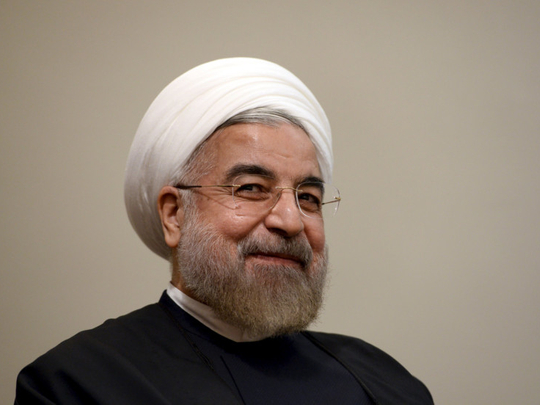
With the imminent lifting of the decade-long sanctions on Iran, many are questioning whether Tehran’s aggressive regional policy will gradually de-escalate, so the country will be able to pick itself up and concentrate on the much-needed programmes of rebuilding and renovation.
So far, unfortunately, Iran seems to be moving in the opposite direction: confrontation rather than conciliation. With this grave situation there seems to be a total absence of any serious diplomatic effort to defuse the rising tension in the region. But sadly, instead, the world’s attention is somewhere else: Iran’s lucrative immediate future. The world’s investors are eagerly waiting for opportunities to grab as much as they can from the country’s billions of dollars in frozen accounts to be officially unlocked soon.“We are looking into a gold mine that will shortly be made available for everyone to dip into,” a senior representative of a London-based leading multi-national investment company told this writer. This reflects what many have feared; that the world’s current priority is not the dangerously rising tension in the Gulf and beyond, but the lucrative business opportunities Iran is expected to offer.
Ending the sanctions has been widely welcomed in both the West and East, including the US, Russia, China and the European Union. Once the sanctions are lifted, Iran will immediately get access to an estimated of $100 billion in frozen overseas accounts. Iran’s crude oil lifting is also expected to almost double from its current level of under two million barrels to nearly four million within a short period of time. Additionally, Tehran has recently said it will urgently need $100 billion to rebuild its much depleted energy industry, as well as $29 billion for renovating its mining and steel production.
Ending the sanctions has been widely welcomed in the US, Russia, China and the European Union.
With such promising prospects, Iran has sadly been unable yet to show any indication of potential changes that might occur in its regional policy in view of the expected bonanza.
On the contrary, it has continued with its recent campaign against its Arab neighbours, particularly Saudi Arabia, following the execution of Shaikh Nimr Al Nimr, alongside 46 other Saudis on January 2, after being found guilty of terrorist activities. In this campaign, Iran singled out one person while ignoring the other prisoners.
Iranian officials remained silent about the other convicted prisoners. Tehran clearly showed interest only in Shaikh Nimr Al Nimr, who alongside 46 other Saudis was found guilty of carrying out various types of terrorist activities on January 2. This somehow confirmed the Saudi accusation that Al Nimr was an “Iranian agent”.
At least 43 of those executed in Saudi Arabia were hard-core Saudi national terrorists recruited by Al Qaida. One of them was the last surviving criminal from a gang that was charged with the attack on a BBC team in Riyadh in 2004.
The attackers killed cameraman Simon Cumbers and crippled reporter Frank Gardner for life. If anyone ever thought of accusing the Saudis of being harsh in the latest sentencing, that should not be Tehran. The Iranian government’s own record of regularly persecuting its opponents is widely known. Iran is reported to have executed almost 1,000 of its own citizens in 2015 accused of demanding democracy.
Coordination needed
However, escalating tensions are not and should not be the way forward. This will not only hurt the Arab Gulf states and the region at large, but will hit Iran much harder. With the country on the verge of opening up to the world through normalising its relations with the international community for the first time since 1980s, Iran could contribute hugely to advancing the region if its leadership begins the process of reconsidering its regional policy.
The first people who will vastly benefit from such a twist will be Iran’s own citizens. With the highest inflation rate since records, more than half of its 75 million population under 25 and almost 20 per cent unemployment, Iran cannot persist with its current belligerent policy in the post-sanctions era.
Coordination, not confrontation, is what is required. Iran’s intervention, directly or by proxy, in many hot spots in the region such as Syria, Lebanon, Yemen, Bahrain, Iraq and the Saudi Eastern Province, as Al Nimr’s activities revealed, has to stop.
The Saudi-Iranian participation in a late December 2015 roundtable discussion at the Syria peace talks gave hope to many that the two principle regional powers may be at last on the sensible track to define, and agree on, each other’s role as well as their interests in the region.
Hopefully, a comprehensive deal can be reached that would finally put a solid end to Syria’s heart-breaking and appalling war that is shattering the country, and pave the way for a lasting understanding over the various regional issues.
No matter what is said about wrong or right, Iran will hopefully at one point reconsider its policy. It has a reasonably moderate and pragmatic president, Hassan Rouhani, who might sensibly lead the way forward out of the current crisis.
The alternative is fear and an economic and humanitarian disaster in the region, including Iran, not dissimilar to the aftermath of the Iraq-Iran war.
With the prices of oil sliding further, it makes this eventuality more plausible.
Mustapha Karkouti is a former president of the Foreign Press Association, London. You can follow him on Twitter @mustaphatache.










